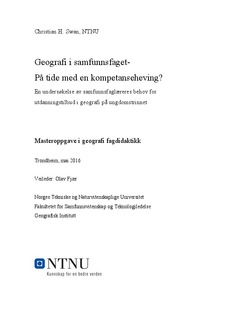Geografi i samfunnsfaget : på tide med en kompetanseheving? : en undersøkelse av samfunnsfaglæreres behov for utdanningstilbud i geografi på ungdomstrinnet
Master thesis
Permanent lenke
http://hdl.handle.net/11250/2449738Utgivelsesdato
2016Metadata
Vis full innførselSamlinger
- Institutt for geografi [1097]
Sammendrag
In Lower secondary school, geography, history and social studies are integrated into one course, where the subjects are supposed to be equally weighted with the same number of classroom hours. However, various studies have demonstrated that teachers do not respect this requirement, but rather prioritize certain individual subjects with more hours. Certain subjects, such as history, tend to get the highest priority, followed by social science, and finally geography. Furthermore, there is a plausible link between a teacher’s specialist subject and how much that subject is prioritized in the classroom. As fewer teachers specialize in geography, it also tends to get the lowest level of prioritization. The goal of this thesis is to build a case to support teachers’ need for competency building in geography and to identify an optimal structure for that training opportunity. It is firmly believed that raising teachers’ competency in Geography in this way will directly support the realignment of the priority of the subject in the classroom.
To gather the information necessary for this kind of study, a national web-based survey was commissioned by Ellingsen in 2014. Of the 3900 teachers invited to participate in the survey, 1917 of them replied (a response rate of about 60%). My task was to use the data collected from the survey for further statistical analysis, through the use of a data program called Statistical Package for the Social Science (SPSS), whereby the survey responses get converted into measurable figures, making it easier to process and analyze the data.
The study shows that there are a significant number of teachers that express an interest in additional geography study. Furthermore, it is logical to suggest that their opinions regarding structure and content should be included in the development of any course, since it may be essential to encourage their participation. The study also shows that there are far fewer teachers with a relevant education or specialization in geography, compared to history and social science. It can, therefore, be concluded that there is a clear justification for additional training to raise competency levels in Geography and thereby increase focus on correcting the balance of equal weighting of classroom hours. To secure the necessary financial funding for this training, government officials should be informed about the current situation, stressing the need for improved geography training for teachers.
